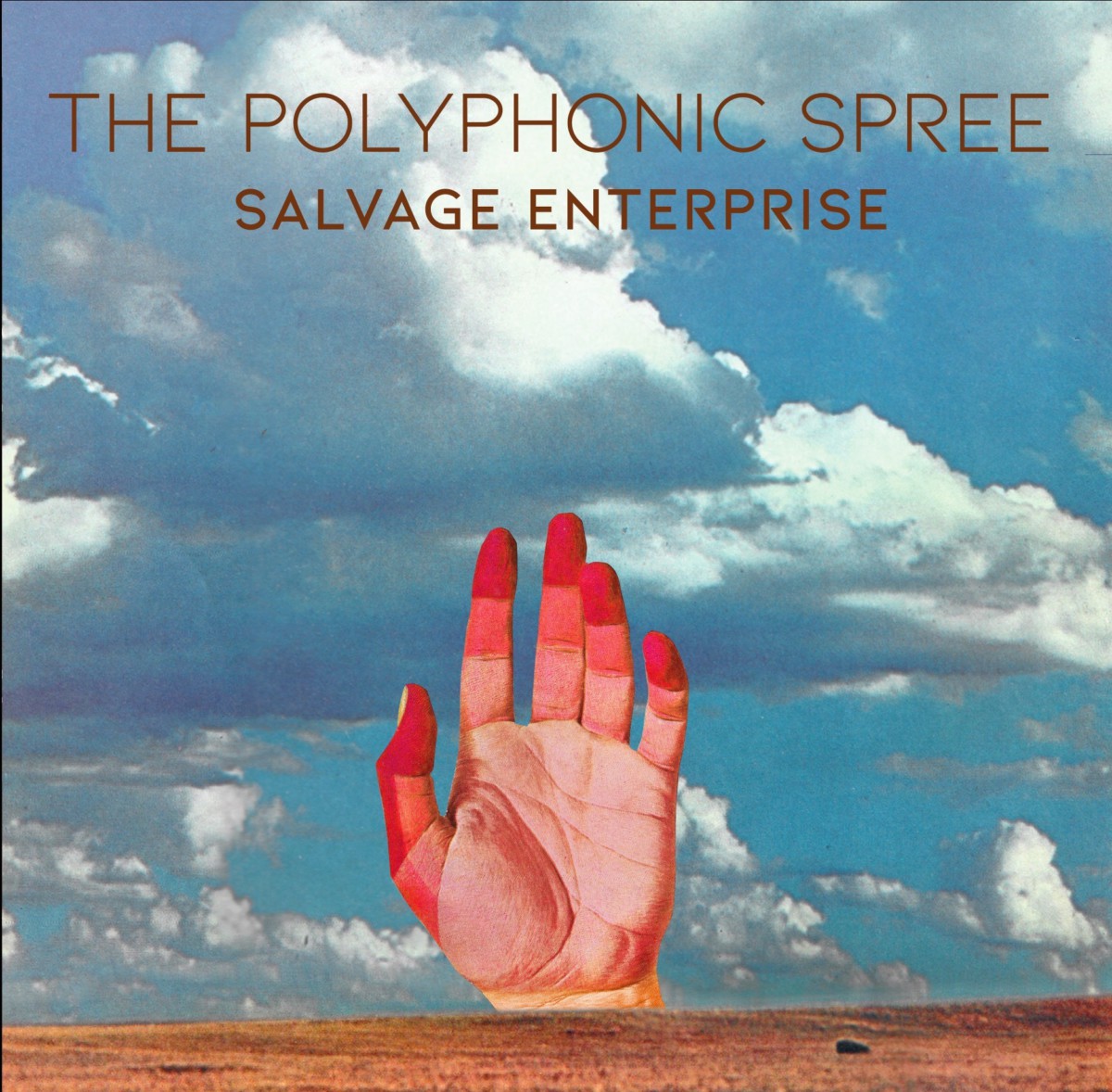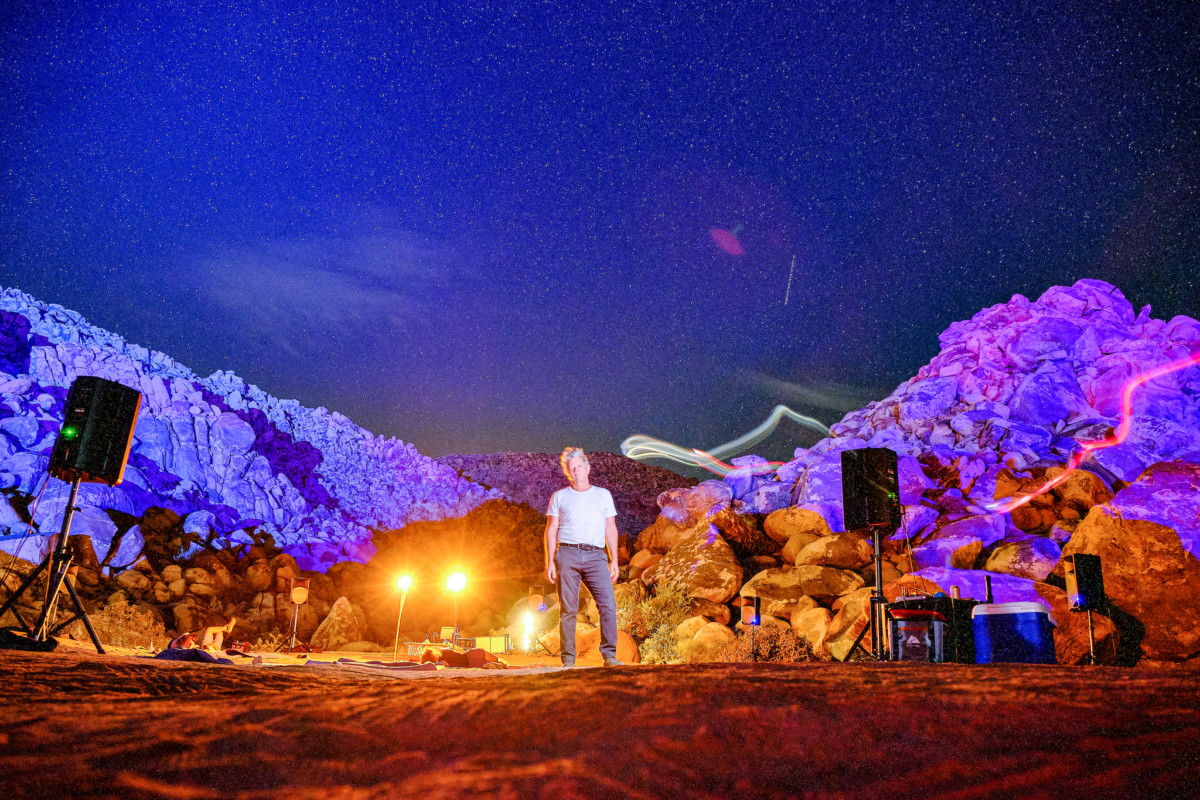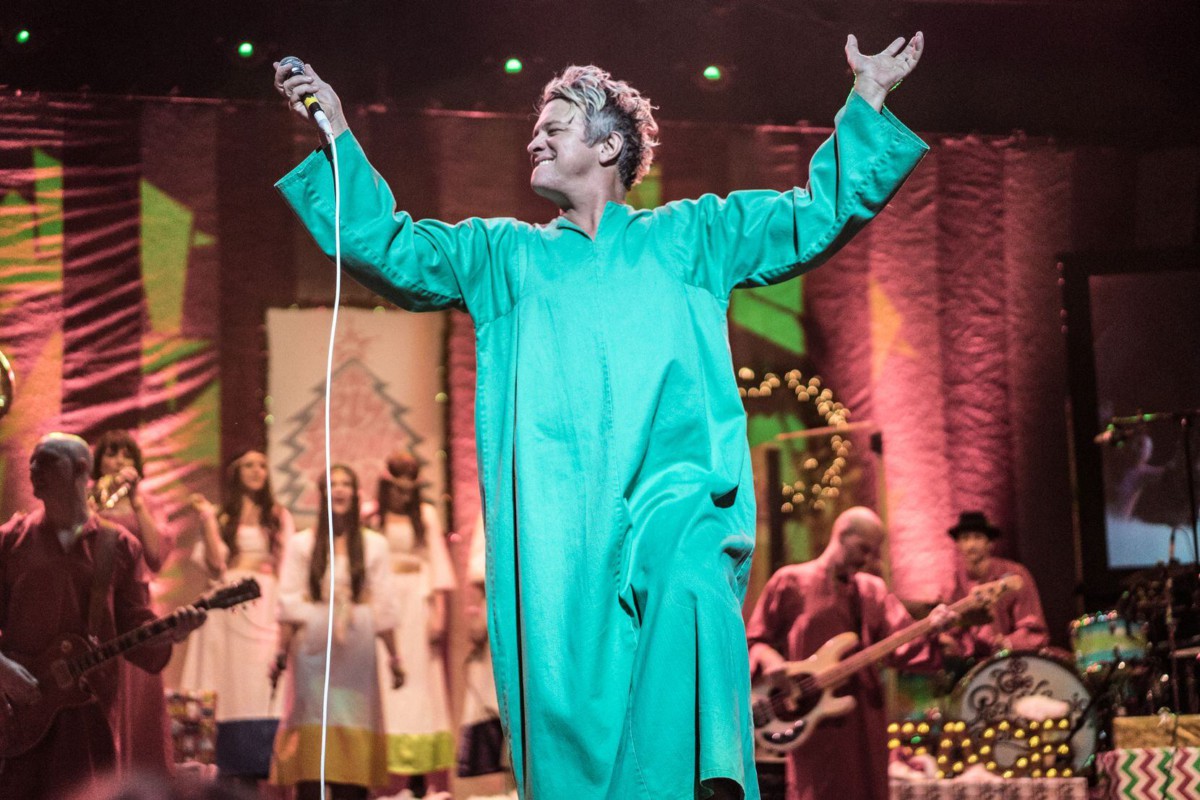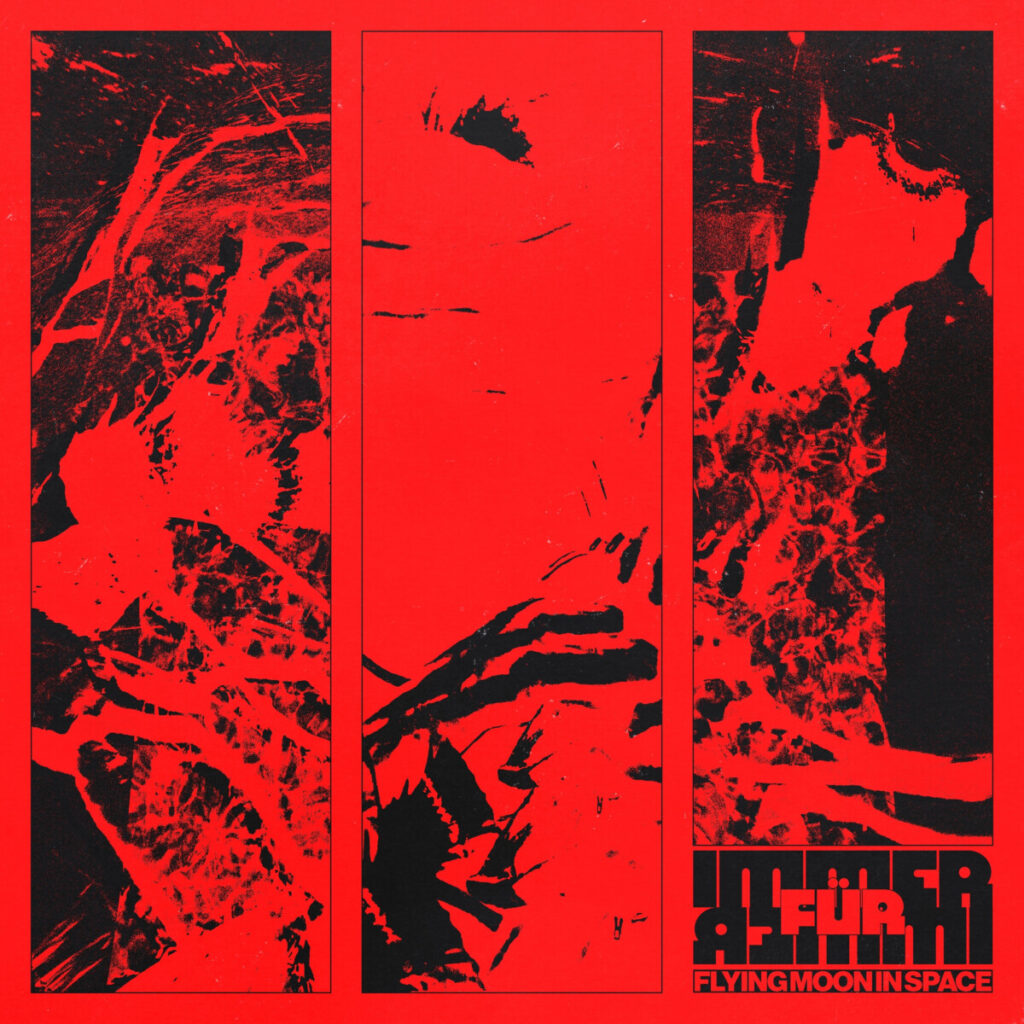Interview: Tim DeLaughter of The Polyphonic Spree
Interview: Tim DeLaughter of The Polyphonic Spree
LeValley:
Hi, this is Jason LeValley from Psychedelic Scene and I’m speaking with Tim DeLaughter of the Polyphonic Spree, who have a new album out called Salvage Enterprise. Tim, thanks for joining me.
DeLaughter:
Thanks for having me.
LeValley:
You’ve mentioned that the new album, Salvage Enterprise, is a rising-from-the-ashes record. What does that mean exactly? Because as far as I know, you’ve never burnt to the ground.
DeLaughter:
Well, for all you know, I haven’t. There’s a lot of things that happen behind the scenes that people don’t really know about. They just kind of go off your work that’s out there, but they don’t really know what’s going on behind all that. Sure. And I was going through a really difficult time in that period, and for me, it felt like rising from the ashes because I thought I was never going to be able to write a song again. That’s the frame of mind I was in. So it was a bit of a debilitating time. And so that’s kind of what I mean by that. I was kind of spiritually broken at the
It felt like rising from the ashes because I thought I was never going to be able to write a song again.
time and thought I was done. And lo and behold, you’re never done when you’re alive. So when you’re a human being, and you forget that sometimes even though you know it. But it took the muse of songwriting and finding yourself and stumbling onto it, and lo and behold, there it is, and you end up kind of saving yourself all over again. So that’s what I mean by that.
LeValley:
Okay. Your experience seems to reflect a lot of people’s experience over the last few years. A lot of people have been going through hard times and coming to spiritual crises and so forth. Well, thanks for explaining that. I noticed that on the new album, there are a bunch of sections, which is a unique approach to take, and that you begin with… I mean, all the songs have a title, but they also each have a section number, and the section number begins with 44. And I’m wondering why 44.
DeLaughter:
Well, if you followed the Spree from the very beginning, it started off with section one. So each album has sections. The songs are referred to as sections, because when I was first putting the band together, when we were putting this body of music together to play a show, I was always referring to them as sections and not really titles of songs. It was just, we’re going from this section to this section, and it was like a body of work, and that was just to play a show, because initially, the whole idea of the The Spree, I was writing songs, but it was also like I was putting together songs for a show, because I was kind of being pushed. You need to get something going. I thought, well, I want to put this band together that I’ve always thought about, and I’ve created this body of work for a show. And we didn’t even have a record yet. We were playing the show. But the songs that I put together for the show ultimately became our first record, which was The Beginning Stages of the Polyphonic Spree. And so, like I said, if you start at the beginning, each record has those sections in parentheses.
DeLaughter:
So that’s the reason why it’s the 44th song of The Polyphonic Spree.
LeValley:
Okay, well, that makes total sense now, for some reason. Well, I didn’t really think this, but I recently did a piece on the first album by Country Joe and the Fish. And on that album, there’s a song called Section 43. It was like, that’s weird.
DeLaughter:
There’s no deep meaning behind it other than we thought, why not continue the sections? And people, if they become a spree fan, in order to get all the records, they can have all the chronological order of the sections of Polyphonic Spree.
LeValley:
Okay, cool. I know that you have Mark Pirro, who played bass with you in Tripping Daisy in your band now, but I was wondering if you have the same group of musicians that you’ve had on previous albums and tours, or if you change it up all the time.
DeLaughter:
Well, it’s been 23 years of The Spree, and, yeah, we’ve been through a lot of members since then. It’s over 100, at least. Over 100. But Mark Pirro is still in the band. Bryan Wakeland was playing drums in the Spree. He’s kind of an alternative drummer when Jason can’t make it. There’s a lot of members that have been there from the previous album, which was Yes, It’s True. But from the beginning, it’s really a few people. It’s myself, Mark, Bryan, on and off. Jennifer Jobe, who’s the opera singer that was with us from the beginning. She’s still in the band. You hear her on this latest record, and I believe that’s probably it from the very beginning group. The rest have gone off to do other bands or start families or moved on.
LeValley:
Yeah. Do you have auditions?
DeLaughter:
Yeah, I do. At the beginning, I didn’t know any people in the symphonic world, so I was just kind of getting whoever could play. I would pick people up at the mall that were playing for people in the malls. I would say like, ‘Hey, man, can you improvise and be a part of this?’ I just didn’t know, but now, after over 20 years of doing it, I’ve really got an amazing selection to choose from. And the musicianship seems to
The way that we had the sound system set up, it was like being outside with headphones on, but no headphones on.
continue to go up in value the longer we’ve been together, because there’s more people that are familiar with The Spree that actually want to be a part of it. So I get a lot of people like that, and then there’s people that are at North Texas, and the audition consists of just kind of coming in and improvising. That’s the only prerequisite. You have to be able to improvise on your instrument and kind of have the spirit for what we’re all about and be able to put up with a band with that many people in it. It’s really not that difficult.
LeValley:
Right. So how many people are in the band now?
DeLaughter:
There’s 22 of us.
LeValley:
Wow. How do you keep everybody happy?
DeLaughter:
Well, they all have lives outside of The Spree. They all have jobs, gigs. They teach. Hopefully the music keeps them happy and interested in doing it. We play a lot of one-offs, but now that we just released this record, we’re going to be gearing up and going on tour. So there’s going to be some folks that can’t make it, which means I’ll have to start finding some folks who can go out on the road. But I don’t know. I guess you just kind of keep the music interesting, and hopefully people are into it. And so far they have been. It’s really expensive for the band to tour, so it’s not like we’re out playing all the time, because we just can’t. It’s just the nature of the beast. But the downtime between records is what’s kind of tough. But we do these one-offs to keep it interesting, keep people on board, but, I don’t know. They seem to be into it. I’ve never had a problem with keeping people. It’s just that the time between records is what gets kind of difficult and just the longevity of a band.
Lauren Logan
LeValley:
Sure. You mentioned that you’ve had hundreds of people in the band, which I’m thinking must be a record. There are certain bands like The Soft Machine and The Fall, who’ve had dozens of members in their bands, but you might hold the record.
DeLaughter:
Well, when you’ve got a band that’s got probably five bands in one. When we first started off, there were 30 people in the band. It’s kind of like in over 23 years, that’s a large number of people to have in a group for that long time. So it’s not that difficult to reach that number. Over 100 people that have been in a band for over 23 years. It’d be pretty disturbing if it was a five-piece band that had over 100 people leaving the band. But with The Spree that has 20 something people in it, it’s kind of a feat that hasn’t been more than that. But usually we have people that kind of stick with us between six to ten years, kind of on average, and then you just kind of have people that maybe they come in for a few and they can’t do it anymore, and then you kind of end up moving on. But over 23 years, I think we’ve been pretty lucky to keep the people we’ve kept.
LeValley:
Sure. I understand that you may be promoting the album by playing in planetariums across the country. Is that coming together?
DeLaughter:
Yeah. In order to spread the word about this record, because I wanted people to hear this record as a whole, I was doing listening experiences where I just had a Sprinter van and twelve speaker QSC speakers, QVC speakers and then a couple of generators, and I just kind of head out and did pop-up listening experiences where I’d say, “Hey, I’m going to be at this location at this time. Come on out, it’s free”. And I’d set these up in a circle, and I had moving blankets, and people would lay down center of the circle and listen to the record for 43 minutes. That was wildly successful, and people loved it, and I’m still doing them, but I thought, what if I could bring this indoors in an area to where they could
I’ve played big with big bands before, and the actual artists are not as approachable, where he (Bowie) was just constantly in our world and very much approachable and very accommodating and never made me feel weird or anything.
kick back, look at the stars? But also we could create a film to the record where they listen to the record from start to finish. And so we came up with the concept, which we’ve been working on with different animators from all over the world that are making pieces per song. And then it’ll be made into a full film which will show in planetariums, and that’ll be in May.
LeValley:
But will you be performing live in the planetariums, too?
DeLaughter:
No, this is just going to be on some. We’ll play, like, the opening of it in certain regions, and then it’s just going to be its own film that plays with the soundtrack of The Spree.
LeValley:
Okay, cool. And also, that whole live listening experience that you just described is really a novel idea. And that’s great to hear that it was wildly successful. I don’t know did that.
DeLaughter:
It all started because I wanted people to hear it as a whole. And today we’re so conditioned to just go from song to song. We have a jukebox in our pockets, and it was annoying to me that there wasn’t more people listening to albums anymore. Kind of like we did when we were younger. You go buy an album, first thing you did was go and play the whole thing and just zone out with it. And this album is that kind of album, and I wanted people to experience it like that. So I really struggled with even releasing the record. I sat on this record for almost two years before even releasing it because I was so perplexed. Like, how can I get people to hear this thing? And then I was sharing the record with my friends, and we’re out on some land, and I was playing it at a campfire on a Bluetooth speaker, and we’re just laying out under the stars listening to the record, and they was like, “Dude, this is amazing”. And I was like, ‘Wow, fuck, maybe I should just do this’. And I can get my own sound system and I can get generators, and I’ll just drive out there and find spots and just do it.
David R. Wilson
DeLaughter:
And it was more of a guerrilla style effort. I didn’t get permission. I tried to do it the right way first, and it turned into just a total bureaucratic mess and expensive. So then I just kind of had to renegade it and just do it. And then I’d find, like, rural land and go out and do it on it. And then I’d start doing it in parks and at beaches, and then people would say, “Hey, I’ve got a friend that’s got some land. You can do it out here. I’ve got a friend that’s got a property that they’re not even started building on it yet, but he owns it. You can go do it there.” And just started doing it like that and then just finding areas where I thought I could get away with it. And then I would just tweet and tweet out there, ‘Hey, I’m going to be at this spot at this time. If you’re in the area, come on out’. And it was anywhere from ten to probably 75 people that would show up, because I’m limited to whoever’s in my social media web and that are located in that specific area at that specific time.
DeLaughter:
So it’s nothing that I could set up. This is something that was literally done within a four-hour period. I just would drive around and be like, ‘Okay, this looks like a good spot. I’ve checked all the boxes of what I thought would make it work, and I could get away with it, and then I’d go for it and set it up. And it takes me about two and a half hours to set it up by myself. And then I would just blast it out there and see who would show up. You just never knew. And then you also never knew how people were going to take the record. Which was also kind of interesting how people would use that time for themselves, the space. Just getting people to tune out and tune into this was something I wasn’t even really thinking about. I’m thinking about, “Hey, man, I want you to hear this record from start to finish”. But also it’s like the grind of life and the chaos that we’re all dealing with. Just unplugging from that and being in this required environment, which is outside looking at the stars and turning your phone off to that.
DeLaughter:
That was its own thing that I wasn’t really thinking that was going to be the benefits of that. But people started doing yoga. People were really emotional. I don’t know. Every listening experience was different. And I really enjoyed doing it. It was super cool. I did it for a month and a half until I ran out of money and then came back home. And I thought, well, I need to get this record out here. Because people keep asking me about it. This listening experience, like, the only way you could hear it is if you came to the listening experience. And so finally got the nerve up to go ahead and put the thing out. So here we go. But still, I still enjoy doing. I’ve done them since then, and I’m probably going to do another tour of them again because just people enjoy it.
LeValley:
Yeah, it sounds a little like you’re inviting people to step outside their normal reality.
DeLaughter:
Yeah, it’s cool. Yeah. And give you permission to do that. And it’s free. It just takes the energy for you to go to that spot, turn your phone off and lay down in a circle. And that’s another thing. The way that we had the sound system set up, it was like being outside with headphones on, but no headphones on. And that’s a weird feeling in itself. The sound was amazing. And so that’s an experience in itself. I don’t know. There was a lot of things that came out about that. That was all birthed in the idea of wanting people to hear it from start to finish. But it turned out that it meant a lot more than just that. It was fascinating.
LeValley:
Yeah. Well, the music of The Polyphonic Spree, like Tripping Daisy, is often categorized as neo-pychedelic. And I’m wondering to what extent the psychedelic experience is factored into your music making.
DeLaughter:
I’ve always. I’ve always been drawn to it, even since I was younger. I was into prog as a kid. I find elevator music to be psychedelic, in a sense, and drugs. You know, I’ve experimented and I’ve had my time with that, and I certainly don’t use it to write. But I appreciate the journey that one can take. And I like to think that my music does that. And I like the experience of a journey. And it may seem more proggy, more than experimental at times, but I think it kind of floats in the lines of being prog and experimental–psychedelic.
LeValley:
Okay, well, The Polyphonics Spree opened for David Bowie on the Reality tour. And I was just wondering what you could tell me about that experience.
DeLaughter:
It was amazing. Night after night. David was a big supporter of the band from the very beginning. He brought us out to. He got us out of Texas. The band had never left outside the state, and this was in 2002. He got a copy of beginning stages of and asked us to come play a festival. He was curating at the Royal Festival hall in London. And of course we said yes. And then we had to get everybody over there, which was a feat in itself. But he’s the one that kind of brought us over. And that show in particular pretty much catapulted the band into a frenzy over there. And we ended up spending the next four years of our lives touring the UK and Europe. And all because of that particular show. The band took off. So we just basically stayed over there and we lived over there, but it was because of him. And then we played another festival that he curated later– the High Line Festival. But when he was doing his last tour, he asked us if we would open up for him. And of course we jumped at it, and it was amazing.
Mike Brooks
DeLaughter:
It got to the point where we really just hit it off with him. He really loved the band. He was very kind and open with us, with me. He would talk to me regularly, pull me to the side. ‘How’s everything going?’ And ask about the songs. And on a nightly basis, he would go out in costume, like, wear a wig and a hat and go out and watch the band. And he’d always be at our sound checks. And he was just a real fan of the group. And kind of like a quarter way into the tour, he pulled me to side. He said, I’ve got a song I want you to sing with me on. And I was like, what? He’s like, what do you mean, sing with you on? But he wanted me to do this duet with him on “Slip Away”. And so he had it all figured out, what he wanted me to do, how he wanted me to enter the stage, come across the catwalk, how I’d come down, where I would land, finish and sing, and I’m singing back and forth with him. And then we meet at the front of the stage where he’s playing a stylophone, and we finish the song together.
DeLaughter:
We ended up doing that on a nightly basis for the rest of the tour. And it went so well that he tried to extend our time with him, but unfortunately, there were other bands that were already obligated. But shortly after we split up, literally two and a half weeks later, he had some health issues happen, and the tour was over. So I don’t know. It was an awesome experience because we were doing a Bowie cover prior to any of this, and being a fan, it was amazing. And to find that he was so open and real, down to earth. Very sincere, super thoughtful. My God, he came on the bus one night and he goes, well, what did you got? Some pizzas and stuff. I figured you were hungry. He would just do stuff like that, just very one on one. I’ve played big with big bands before, and the actual artists are not as approachable, where he was just constantly in our world and very much approachable and very accommodating and never made me feel weird or anything. It was just a very genuine person, which made that experience so much more amazing.
LeValley:
That’s great to hear.
DeLaughter:
Yeah.
LeValley:
Well, you’re going to be starring in a new film called El Toto por Cristo.
DeLaughter:
I play Gabriel, an angel, in this. It’s a Josh David Jordan film. It’s all in black and white, and it’s about the orthodox church, and it’s ‘a fool for Christ’ is what that translates to. And it’s about this particular father’s journey through the church, the process. And I play Gabriel. It’s going to be interesting.
LeValley:
So is it a pretty big…?
DeLaughter:
I mean, it’s an independent film. This is during the strike, when you’re going to see a lot of great independent films pop up here in the next year or so because a lot of actors weren’t able to do big budget films. And so you have an enormous amount of independent films that were made. We just haven’t seen them yet. But it’s going to be in the breadth of that. I don’t want to give too much away. It’s not a very big role, but I’m throughout the whole film, but I play an angel. That’s pretty much all I can say.
LeValley:
Okay. All right. Well, the new album is out now. It’s called Salvage Enterprise. And, Tim, I want to thank you again for joining me. It’s been an absolute pleasure.
DeLaughter:
Thanks for having me. I appreciate it.
LeValley:
You bet. Have a wonderful day.
Gallery
Recent Articles
Can Molly Mend Your Marriage?
•
February 16, 2026
Immer Für Immer by Flying Moon in Space–Album Review
•
February 13, 2026

Loading...






